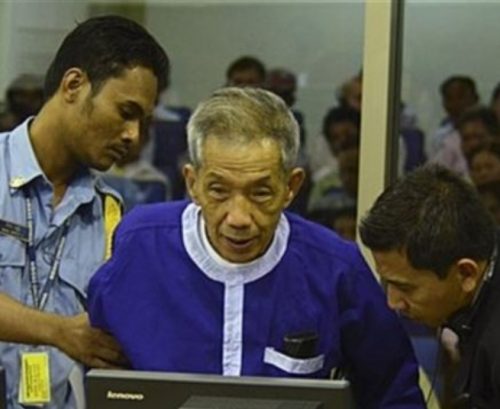3 February 2012 – The appeals chamber of the United Nations-backed tribunal in Cambodia trying cases of mass murder and other crimes committed under the Khmer Rouge regime today sentenced the former head of a notorious detention camp to life in prison, upholding an earlier conviction and extending the existing jail term.
The Supreme Court Chamber of the Extraordinary Chambers in the Courts of Cambodia (ECCC) upheld the conviction of Kaing Guek Eav, alias Duch, and ordered that he be jailed for life, the maximum sentence under the law for crimes against humanity and grave breaches of the 1949 Geneva Conventions.
They deserve the highest penalty available to provide a fair and adequate response to the outrage these crimes invoked in victims, their families and relatives, the Cambodian people, and all human beings.
The court quashed the 35-year sentence handed down by the trial chamber on 26 July 2010 for war crime and crimes against humanity. It also overturned the trial chamber’s decision to grant Mr. Kaing remedy for illegal detention by the Cambodian military court between 1999 and 2007.
The prosecution had argued in its appeal that the earlier judgement gave “insufficient weight to the gravity of Duch’s crimes and his role and his willing participation in those crimes.” The court dismissed Mr. Kaing’s own appeal in which he argued that the ECCC had no jurisdiction over him.
Mr. Kaing headed the S-21 security prison in Phnom Penh, where numerous Cambodians were unlawfully detained, subjected to inhumane conditions and forced labour, tortured and executed in the late 1970s. A minimum of 12,272 people died at S-21 over a period of three years.
“The crimes committed by Kaing Guek Eav were undoubtedly among the worst in recorded human history,” said Judge Kong Srim, the president of the ECCC’S Supreme Court.
“They deserve the highest penalty available to provide a fair and adequate response to the outrage these crimes invoked in victims, their families and relatives, the Cambodian people, and all human beings.”
The court rejected claims for reparation either because they would be unenforceable, or due to the fact that implementing them would require Mr. Kaing, who is indigent, to pay, or place the compensation obligation on the State.
The ECCC is a hybrid court set up after a 2003 agreement between the UN and the Cambodian Government with the aim of trying those accused of the worst crimes during the Khmer Rouge regime.
As many as 2 million people are thought to have died during the rule of the Khmer Rouge between 1975 and 1979, which was then followed by a protracted period of civil war in the South-East Asian country.
Source: United Nations



